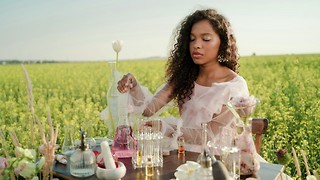Baz Luhrmann at the Union
Baz Luhrmann talks cinema, television, and how to get creating.

Baz Luhrmann enters the Union chamber in a slow-motion walk as measured and mesmerising as the opening credits of one of his films; as he reaches the stage, he spins around. “Now”, he says confidently “that’s direction”. Luhrmann is highly engaging. Again and again he addresses questioners by their first names, establishing grounded personal relationships with his audience.
He begins by talking about the difference between his films and his newest venture, a Netflix show about New York hip-hop in the 1970s, when the city was “pretty good” so long as you “wore a coat and didn’t look anyone in the eye.” The series will be entitled The Get Now. “This idea began years ago”, he says. “It was probably going to be a film.” The shift to television is a recent development, driven by changes in the industry. There’s a “total revolution” happening now, he says. “TV needs a new name.” He goes on to argue that there are many things you can do with television that you could never do on film: with Netflix there is “no constraint.” Whether it is violence, sex, or controversial points of view, there is “intense creative freedom. I’ll try not to be foolish. I am a foolish person.”
He breaks off from his train of thought for a moment to rearrange the chairs. “The sightlines are like that”, he gestures with open arms. “Let’s sit further up-stage”.
Baz Luhrmann may be a world-famous director, but he can’t shake his roots as an actor. He is a performer at heart, and we are privy to an exclusive one-man show. Ultimately, though, he became a director and not an actor. “Probably because I had minor roles in soapies!” he jokes initially. But he then describes his childhood in a small town, meaning he “had to do it all… I tried out theatre and an opera company, I was involved in music, acting”, though he “wouldn’t title myself. I don’t really think of myself as a director, or writer, or producer, or music producer. I have one currency: telling stories.”
In that small town “we had a little cinema. My family ran the local one. That’s where the red curtain idea came from. There was a little red curtain in the cinema.” He developed a great love of old movies – Citizen Kane and The Red Shoes are the ones that came to his mind – and their “stylised openings”.
He was asked why he turned down the chance to direct Harry Potter. “My agent rang, and I said ‘What’s this Harry Potter? Right now I’m trying to reinvent the modern musical!’” Luhrmann read the script and saw a lot of “imagination at work there”, but ultimately decided that “somebody else can do that job really well.”
Luhrmann pauses after this long monologue. “Thanks for the therapy!” He rolls his eyes. “Phew!” He breathes dramatically, and the audience laugh again.
He has adapted several texts with the status of classics – Romeo and Juliet and The Great Gatsby are two. He says that his film-making is “in service to illuminate the text.” He is a great “devotee” of Shakespeare; “obsessed” he concedes. He likes to imagine “If Shakespeare made a movie, what would he do?” and he “interprets material” for “this particular audience in this particular moment.”
Controversially, his soundtrack for Gatsby was full of hip-hop. “Fitzgerald himself was hugely criticised for putting jazz and African music into the text”, so his musical choices were in the same idiom. “I didn’t do it to work with Jay Z”, he jokes, “though that was good…”
He is equally loyal to his regular actors. Leonardo di Caprio is “a friend, and as a friend he is really smart and very funny.” As an actor he is “totally relentless”.
The Speakers Officer asks about similarities between himself and Gatsby. “He gets shot!” says Luhrmann in incredulous reproach. The only similarity he concedes is that they are both hopeless romantics. “I am old enough now that I think I am one. Gatsby has this perfect image in his mind of a brief meeting with this girl. Nothing interferes with the narrative in his mind and view of the world.” This view, he says, is “wedded to tragedy”. “For me,” he says, “I don’t know if it will end in a gun-shot, but something has got to give.”
He has one piece of strong advice for young creatives, one that prompts him to demand, “Bring me the hand mike!” The advice is simple. “Do not wait for permission to do things.” He is adamant that people are “ready”; that the hardest thing to do is to “get a piece of paper and a pen. Write ideas. Tell stories. Get a film camera and make a film. Start tomorrow!”

 News / Cambridge scholarship recipient trapped in Gaza21 July 2025
News / Cambridge scholarship recipient trapped in Gaza21 July 2025 News / Chancellorship candidates express concern about conduct of election 19 July 2025
News / Chancellorship candidates express concern about conduct of election 19 July 2025 News / News in Brief: Chaucer, coffee-houses, and challenging degrees20 July 2025
News / News in Brief: Chaucer, coffee-houses, and challenging degrees20 July 2025 News / Write for Varsity this Michaelmas13 July 2025
News / Write for Varsity this Michaelmas13 July 2025 News / Trinity exam burglar jailed for 11 months18 July 2025
News / Trinity exam burglar jailed for 11 months18 July 2025







